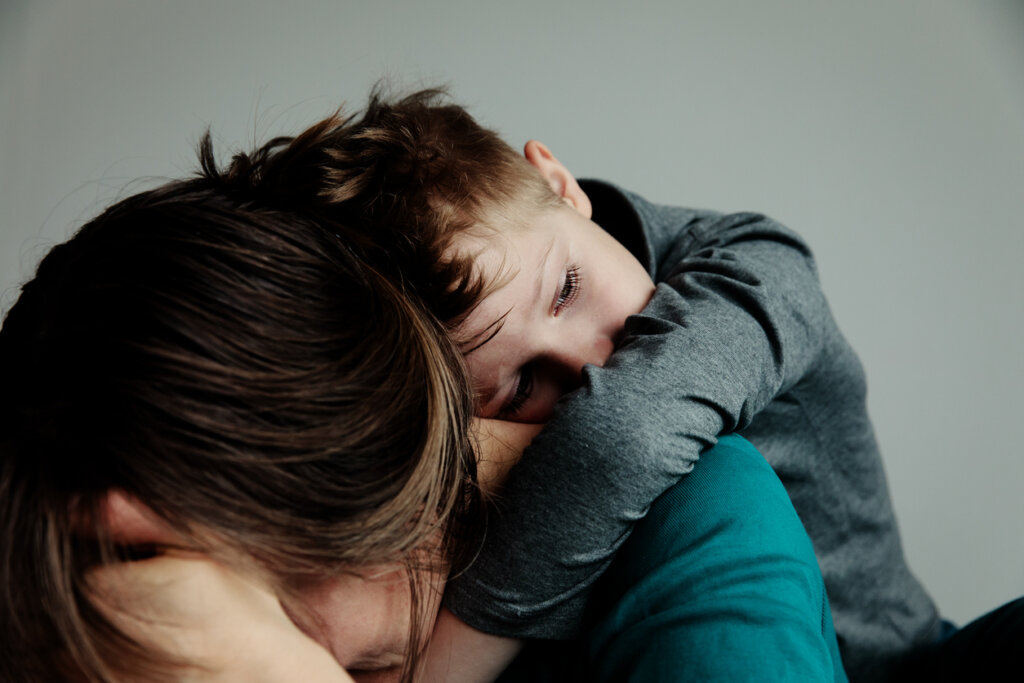Why Some People Dislike Physical Contact


Written and verified by the psychologist Elena Sanz
There are few things more comforting than a hug. It’s a gesture that makes you feel loved, supported, and safe. However, not everyone experiences these pleasant sensations. In fact, for some, even a simple touch on the shoulder can cause them great discomfort.
Physical contact can be of various types and transmit different messages. It’s used to say hello and goodbye, convey support, and show empathy or affection. In short, it unites us and brings us closer to others. Indeed, for most, it’s an extremely pleasant stimulus.
Nevertheless, there are certain circumstances and personal characteristics that can make this contact feel invasive or threatening. Indeed, if you know someone who avoids hugs, is uncomfortable with kisses, and tends to keep a safe physical distance, you may well be wondering what’s wrong with them.
In the event that this is a person close to you, you may have even felt rejected by their attitude. Knowing the reasons behind their behavior will help you understand them. Let’s take a look at some of the possible causes.
1. Parenting style
A study has discovered that the degree to which we show physical affection and are comfortable with it depends on how we were raised. For instance, growing up in a close and loving family unit encourages little ones to adopt the same open and touch-oriented style. Conversely, if the parents were undemonstrative, the children are likely to adopt this same distant attitude.
However, this isn’t decisive as, in some of these cases, the exact opposite occurs. As a matter of fact, some people who grew up with a lack of physical affection may later try to compensate for it. They’re the ones who always take the initiative and kiss and hug those close to them.

2. Low self-esteem and insecurity
Those who dislike physical contact may not have strong and healthy self-esteem. In fact, it’s been proven that the most insecure people generally feel threatened by being close to others. In effect, they feel more exposed. This is especially threatening if they suffer from social anxiety.
By marking and keeping their distance, they feel more in control of the situation. In fact, it means they avoid feeling vulnerable. Furthermore, they feel like it saves them from rejection or an emotional bond that’s too intimate.
Refusing physical contact is often indicative of a lack of trust, either in ourselves or others.
3. Self-image and body awareness
The self-image and the relationship they have with their own body can also be contributory factors. In fact, they may have a poor image of themselves. This means they’ll (more or less consciously) feel rejection toward their body or their image.
Therefore, if they feel ugly, unpleasant, unattractive, too tall or short, too fat or skinny, or perceive themselves as full of flaws, they’ll probably avoid being touched by others. In a certain way, they may even feel unworthy of that contact or being excessively exposed to it.
They may also have little body awareness, which means they don’t usually listen to their body and aren’t in contact with it. Thus, the touch or hug of another person makes them instantly return to their body that they’re not used to paying attention to or really inhabiting. This can make them feel uncomfortable.
4. Cultural patterns
Obviously, the environment in which they grew up and in which they live now also shapes their opinions regarding physical displays of affection. For instance, in certain cultures, physical closeness is encouraged and exalted, while in others it’s restricted and frowned upon.
5. Fears and phobias
They may avoid getting close to others due to a phobia of germs, dirt, or the spread of certain diseases. It might even be a pre-existing fear of theirs that has worsened due to the recent pandemic.
However, there are some people who really can’t stand physical contact, and the mere thought of being touched by another causes them extreme anxiety. This is an irrational fear known as haphephobia.
6. Trauma and abuse
Lastly, if they suffered sexual or physical abuse in the past, they might reject physical contact. Indeed, previous traumas and negative experiences often generate a great fear of establishing physical closeness with others.

Needing physical contact
The greater or lesser tendency to seek and enjoy physical contact could be a personality characteristic. In fact, in reality, there are different languages of love and each one of us expresses affection in a different way. However, research does tend to support the benefits of physical contact for humans.
Physical contact reduces stress levels, improves health and the immune system, enhances positive emotional states, and promotes social relationships. For these reasons, it’s important to work on any aspects that make us perceive contact as unpleasant or dangerous.
All cited sources were thoroughly reviewed by our team to ensure their quality, reliability, currency, and validity. The bibliography of this article was considered reliable and of academic or scientific accuracy.
- Forsell, L. M., & Åström, J. A. (2012). Meanings of hugging: From greeting behavior to touching implications. Comprehensive Psychology, 1, 02-17.
- IsHak, W. W., Kahloon, M., & Fakhry, H. (2011). Oxytocin role in enhancing well-being: a literature review. Journal of affective disorders, 130(1-2), 1-9.
- Suvilehto, J. T., Nummenmaa, L., Harada, T., Dunbar, R. I., Hari, R., Turner, R., … & Kitada, R. (2019). Cross-cultural similarity in relationship-specific social touching. Proceedings of the Royal Society B, 286(1901), 20190467.
This text is provided for informational purposes only and does not replace consultation with a professional. If in doubt, consult your specialist.








